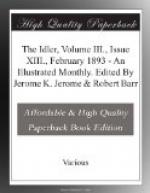The utterance of these words by Mr. Irving is simply thrilling. The tones, the glances, the approach, the embrace, lift up the words into new light, keen and tender as the brightness of a summer morning. The words themselves are by no means striking, are, indeed, the merest commonplace, but, uttered with the natural pathos of a consummate actor, they carry the play to its most subduing climax. The humanity and the genius satisfy expectation in its most eager and jealous temper. Failure at that point would have ruined the play. Which was better, Lear or Cordelia, in that critical action? We must first settle, Which is better, the star of morning or the morning star?
[Illustration: MR. IRVING AS “KING LEAR.” (FROM THE LYCEUM SOUVENIR.)]
* * * * *
As I opened this brief review with a reference to the religious standpoint, it may be well now to ask how the Church is to regard the Stage as an educational institution? The Stage cannot be put down. It responds to an instinct which is ineradicable, and which need not be ignoble. The parables of the New Testament are the sublimest recognition of that instinct. The drama is older than the theatre. Much of the greatest preaching has been dramatic, by which I mean that it has touched human life through the medium of story and parable, coloured and toned by a living fancy. Sometimes, too truly, the dramatic in preaching has degenerated into impossible anecdotes, most of them originating in the Far West of America, yet even such anecdotes testify to the overpowering force of the dramatic instincts when limited to their most vulgar conditions. My submission is, that a properly-conducted stage might be the most powerful ally of the pulpit. I advance upon this submission, and contend that the function of the preacher is infinitely superior to the function of the actor. Whatever the preacher has to say that is distinctive he can trace to what he believes to be a Divine and authoritative origin. I hold the great preacher to be a spiritual medium. In his next evolution he will simply tell the people whatever may have been given him in the same hour to say. This does not mean that indolence will supersede industry. Through the indolent man God sends no messages. The true prophet will always be preparing himself. By learning, by meditation, by self-discipline, the true prophet will prepare his heart for the incoming of the Eternal Spirit, and the glory of Heaven will be as a fire on the altar of the honest heart. Art preachers we have had in too great abundance. Mechanical talkers have brought upon the pulpit the disrepute of dulness. The age now waits for the messenger in whose loving heart there is the glow and the radiance of divinest sympathy. The great actor himself would be the first to admit that the preacher cannot trace his own public secondariness to the poverty of his themes. Where the preacher falls behind the actor, it is because the preacher does not realise the majesty and the tenderness, the vehemence and the urgency, of his own message.




